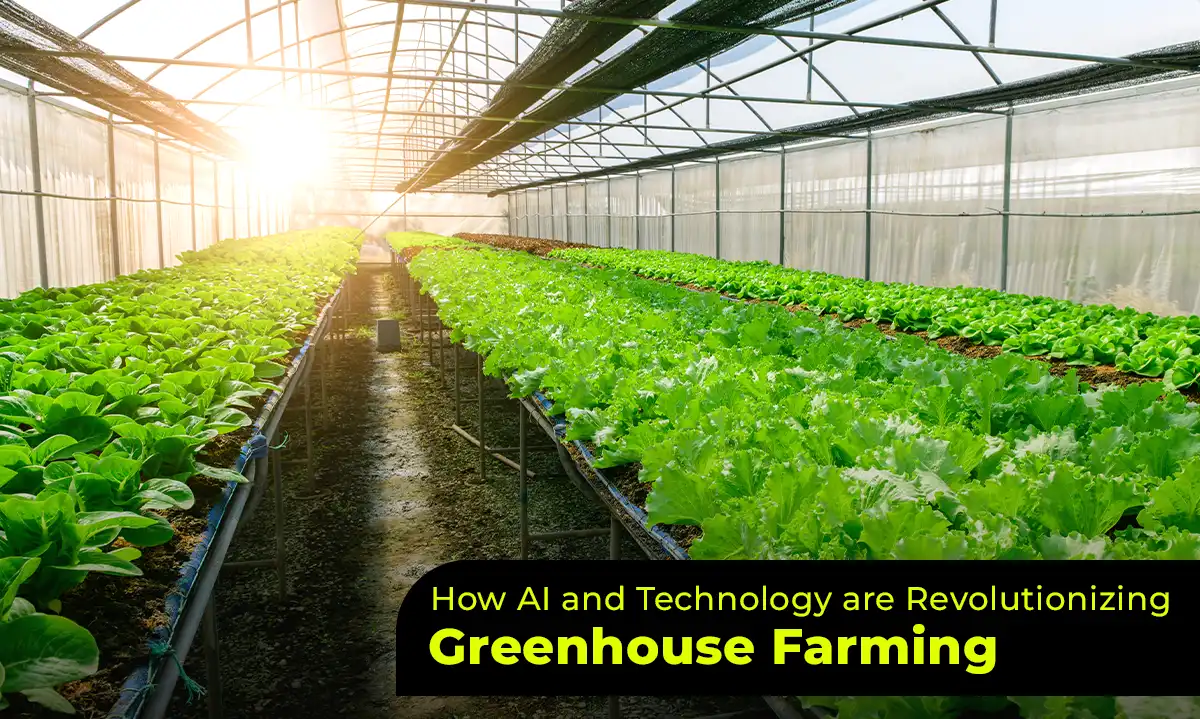AI and Technology Revolutionizing Greenhouse Farming

Gone are the days of back-breaking labor and unpredictable yields. Today, greenhouse farming is on the cusp of a technological revolution, driven by artificial intelligence (AI) and a suite of innovative tools. These advancements are not only transforming the efficiency and productivity of greenhouses, but also opening doors for new entrants and exciting possibilities in the agricultural landscape
AI: The Brains Behind the Automation
Traditionally, greenhouse farming relied heavily on human expertise to maintain optimal growing conditions. Factors like temperature, humidity, light levels, and irrigation all needed constant monitoring and adjustments. Enter AI, a powerful tool that can analyze vast amounts of data from sensors and weather forecasts to make real-time decisions for the greenhouse environment.
Here's how AI is making a splash in the world of greenhouses:
Climate Control on Autopilot: AI algorithms can learn optimal temperature, humidity, and ventilation settings for specific crops based on historical data and real-time conditions. This ensures consistent growth and minimizes the risk of disease and stress.
Predictive Maintenance: By analyzing sensor data, AI can predict potential equipment failures and schedule maintenance before issues arise. This proactive approach prevents downtime and ensures smooth operations.
Resource Optimization: AI can analyze water usage and predict irrigation needs based on plant growth stages and weather conditions. This helps to conserve water, a precious resource in many regions.
Disease and Pest Detection: AI-powered image recognition tools can identify early signs of disease or pest infestation in plants through camera systems. This allows for swift action to be taken, minimizing crop damage.
Tech Toolkit for a Thriving Greenhouse:
AI is just one piece of the puzzle. Greenhouse farms are also benefiting from a range of innovative technologies:
Automated Watering Systems: Precise irrigation systems deliver the exact amount of water needed by each plant, eliminating waste and ensuring optimal growth.
LED Lighting Systems: Modern LED lights mimic natural sunlight while offering greater control over light intensity and spectrum. This allows for efficient year-round cultivation and optimized plant growth.
Hydroponics and Vertical Farming: These techniques enable efficient use of space and resources, making it possible to grow crops in urban environments or areas with limited land availability.
Benefits for Everyone: From Farmers to Consumers
The impact of AI and technology in greenhouses extends far beyond the walls of the facility. Here's how it benefits everyone involved in the food chain:
Increased Efficiency and Productivity: Automation and data-driven decision-making lead to higher yields and improved crop quality. This translates to greater profitability for farmers.
Reduced Food Waste: Precise climate control and early disease detection minimize crop losses, leading to a more sustainable food system with less waste.
Year-Round Availability: Greenhouse technology allows for the cultivation of fresh produce all year round, regardless of the season. This ensures a consistent supply of high-quality food for consumers.
Reduced Environmental Impact: AI-powered resource optimization and hydroponics minimize water usage and optimize land use, leading to a more sustainable agricultural footprint.
The Rise of the "Tech-Savvy" Farmer:
The adoption of AI and technology in greenhouses is not just about replacing human labor. Instead, it creates a new role for farmers: the tech-savvy operator. These individuals leverage data insights from AI and manage automated systems, ensuring the smooth running of the sophisticated greenhouse environment.
Is Greenhouse Farming for You?
The rise of technology in greenhouse farming has opened doors for new entrants interested in this exciting field. While large-scale commercial operations exist, there's also a growing trend of smaller, local greenhouse farms catering to specific markets.
If you're intrigued by the idea of greenhouse farming, here are some resources to get you started:
Research and explore the various technologies available, from AI platforms to automated systems.
Consider the specific crops you might want to grow and research optimal growing conditions using these technologies.
Look into educational resources and training programs to equip yourself with the necessary knowledge and skills for tech-enabled greenhouse farming.
A Sustainable Future for Food Production:
The integration of AI and technology in greenhouse farming Chennai represents a significant leap forward in the agricultural sector. By optimizing resource use, ensuring consistent yields, and minimizing waste, these advancements contribute to a more sustainable and efficient food production system. The future of farming is bright, and technology is at the forefront of the revolution, paving the way for a more secure and abundant food supply for all.
Latest blogs
JOIN OUR COMMUNITY !
Stay connected with Getfarms! Follow us on social media for the latest updates, exclusive offers, and a glimpse into the world of farmhouse living. Join our community today




























